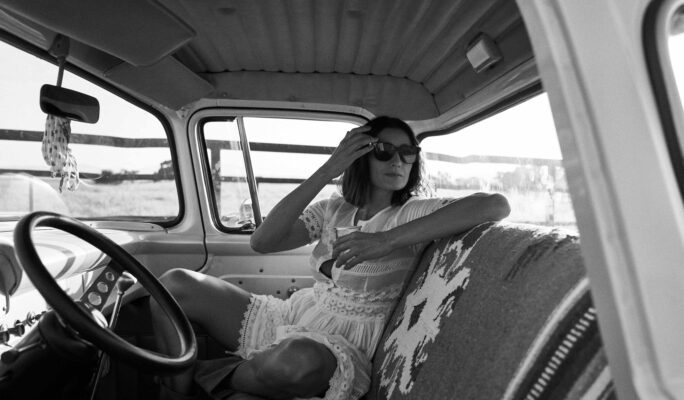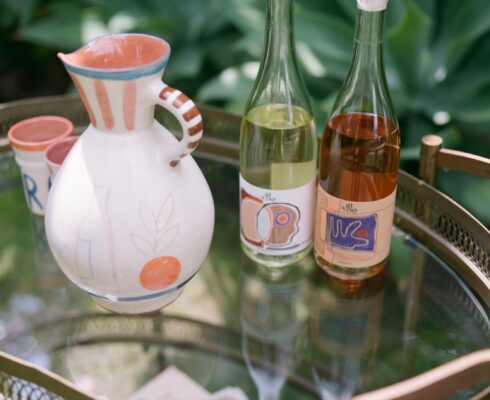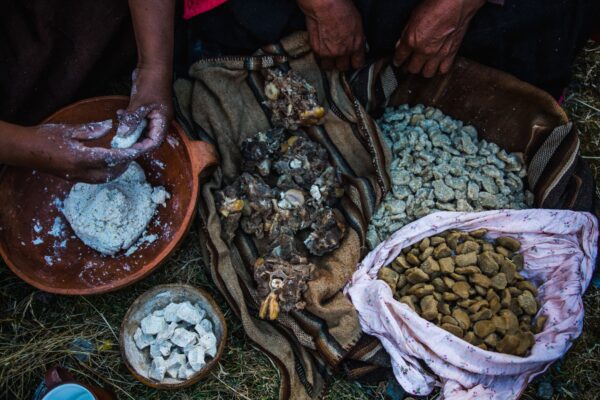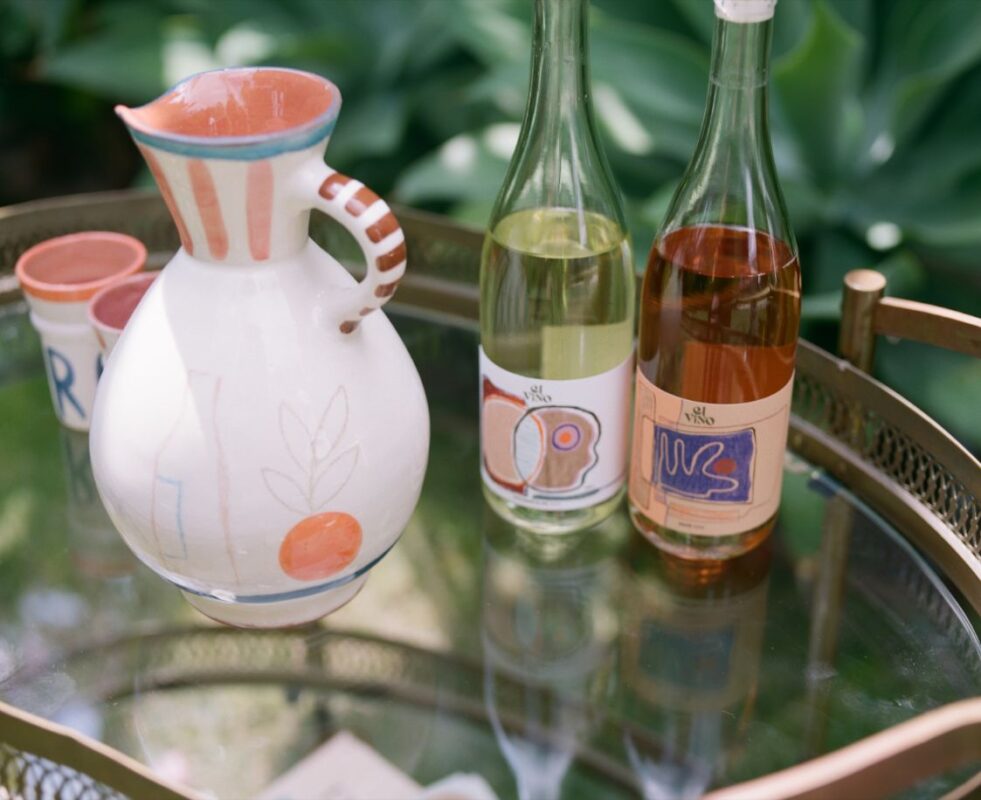
COFFEE WITH
A CONVERSATION WITH LULU MARTINEZ OJEDA AND DANIELA VARGAS DIEPPA OF EL VINO
Name: Lulu Martinez Ojeda and Daniela Vargas Dieppa
Profession: Winemaker / Entrepreneur, both Co-founders, EL VINO
Nationality: Mexican / Colombian
Zodiac sign: Gemini / Scorpio
Instagram:@shopelvino
LATINNESS: We read that EL VINO was conceived after a trip to Valle de Guadalupe with friends. How did they meet you, Lulu?
LULU: Well, Dani is the best one to tell the story, but basically, I spend my life here at Bruma (Valle de Guadalupe). I avoid coming on weekends because there are a lot of tourists. We work Monday to Friday, and Saturday and Sunday are for relaxing at home.
Someone from the winery kept calling me, saying: ‘There’s this lady that wants rosé. We’ve already told her there’s none left, but she wants rosé.’ I was like:’Ok, tell the lady that there’s no way that we can have it.’ Then I get here on Monday, and then I see someone running behind me. It was Dani (Vargas Dieppa), and she said: “Oh, I was interested in your rosé.”I thought, ‘Ah, the rosé lady.’
She ended up getting three or four cases of a rosé vintage that I was going to bottle three or four weeks after that. She was very persuasive, and told me: “I want to make wine. Could you make some wine for me?” She spoke to me about her idea for el VINO saying: “I’m in the fashion industry, and I want something to not just be good, but to be pretty in concept. Something you really want to drink, love, see, with all of the senses.”
Dani had actually come to Bruma before with her great friends and soon to be the other founders of el VINO – Sofia Adjodan, Jessica Flesh and Ramya Giangola – and I loved the idea of it being an all women team. I’m a wine geek, so I always focus on what’s inside, and I think today it’s important to have a different perspective. Wine is supposed to be good, but there has to be more than that. I love this new kind of approach of seeing the product as a whole, and making it beautiful inside out.
DANIELA: I had been talking for a long time saying I was going to create a vineyard before I was going to create a wine. Then a friend told me to go to Valle de Guadalupe, and I love their wine and they had they offered me a wine tour. Then I realized their rosé reminded me of my favorite rosé, which is very hard to find on this side of the pond. It’s from France, clearly. That’s when I thought: “I need to speak to them. Maybe they’ll do my own rosé. And the rest is history as they say!”
I met the owner of the venue and Lulu’s partner in this vineyard, and told him we wanted to launch a wine company called EL VINO through which we were mixing art, culture and fashion in wine, and making the aesthetic of the wine industry a bit less intimidating and prettier. When he said he had these extra bottles of wine that he wanted me to taste the next time I went to Valle de Guadalupe, I said “No, no, no, let’s go now”. Everyone who knows me know I get thigns done now!
He brought me over and I met Lulu and we felt that she would be the perfect fifth partner of el VINO. I’ll let her continue the story now.
LULU: We were just starting. In winemaking you have to program things. You can’t just say, ‘Oh, let’s do wine!’ The grapes only are harvested in July and August. So I have this grenache that I had made and we loved. I studied in France, and lived there for sixteen years, so I think France is the only country that really has a rosé drinking culture. Spain, Italy, Portugal, they’re traditional producers of wine, but not rosé wine. So for me, we had to do this very elegant, subtle, crisp, bone-dry rosé kind of Provence style.
After meeting Daniela, I said this makes complete sense. It’s like I made this wine for them without even knowing it. Actually, I had made this wine for myself which shows how much we have in common. So we decided on a grenache, which is kind of a typical rosé varietal for Provence. After Dani showed me the artist, LRNCE (Laurence Leenaert) with whom we were going to collaborate, I saw her style, which was very elegant yet fun, and everything feel into place.
The wine was actually in phase with the creation of it all. That was the initial idea, to be coherent with the product and the image. There are different techniques to make rosé. For me, the “noble technique” is what we call it, the direct press, which means that we harvest the grapes, we crush them and we leave the skins together with the must. Because the must -the juice- doesn’t have color. What gives it the color are the skins. We leave them together for one, two, three, four hours, then we press, we get just the must, and that must, which is slightly colored, will then go into fermentation. So while I was working on that technical part, the four other founders of el ViNO who all happen to work in fashion were taking care of the creative side and everything just came together in this really perfect way.
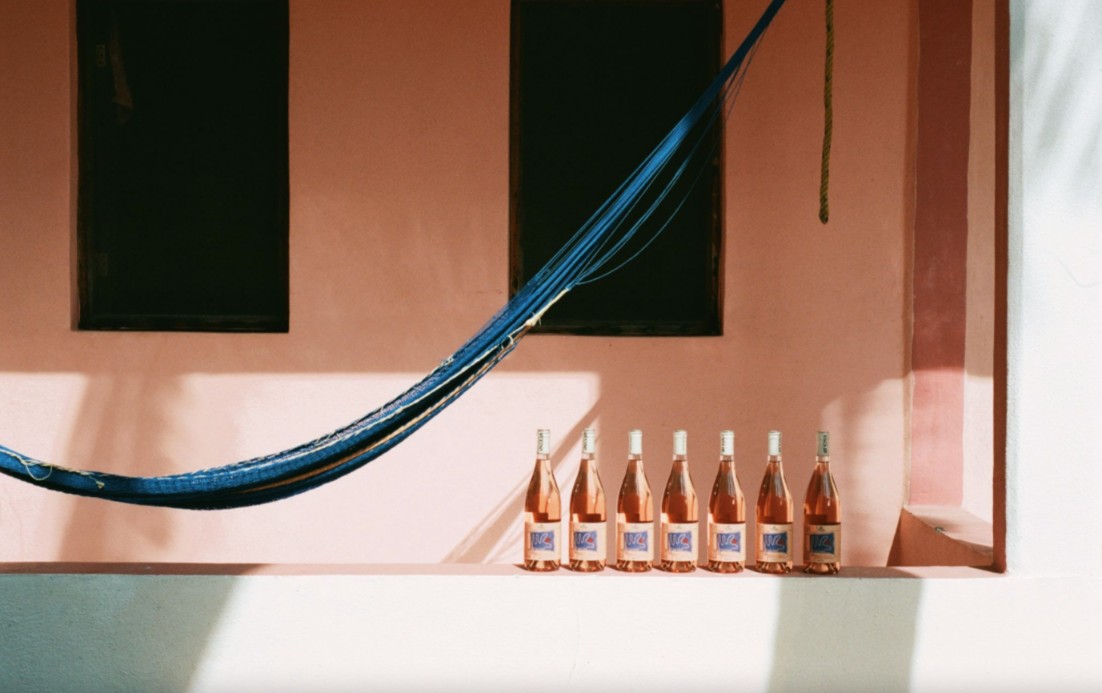
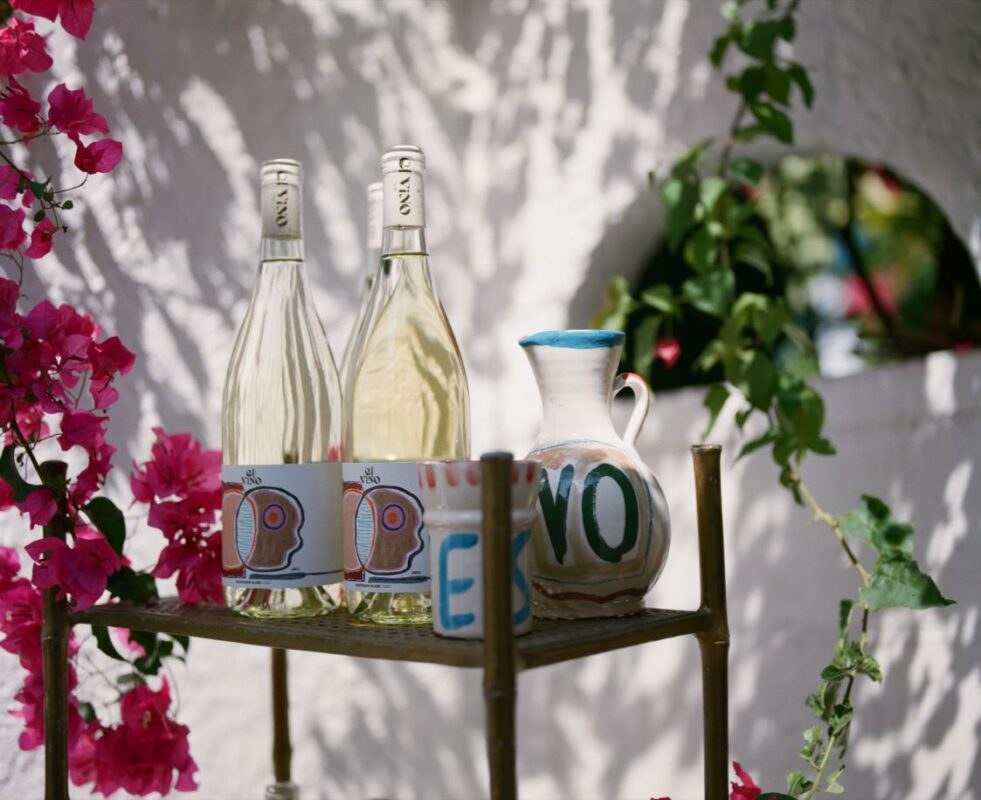
LATINNESS: As a female-founded wine company, you’re really shaking up the industry with the idea of bringing aesthetics into the process from the start, as you mentioned. Why do you think this hadn’t been done before?
LULU: Well, I don’t think us winemakers and wine geeks are fashionistas at all. I’m very geeky, and it’s two very different ambiences, milieu, cultures where winemaking and everything that we do is slow. It takes time. It needs patience. In the fashion industry everything’s quick. You have to be one step ahead, and everything’s moving very quickly.
I think, fundamentally, we’re very traditional in winemaking. So they are two very different ways to work. It’s difficult for us winemakers to approach the fashion industry like that because we’re just so different in approach. In the wine industry, unfortunately, we’ve learned this kind of history, very heavy baggage of tradition and being very snobbish, although it’s changing. A lot of people are very much intimidated by wine. A lot of people say, ‘Oh, no, I don’t know anything about wine’. I’m like, well, just drink it. And really that philosophy chimes so much with what el VINO is about, breaking down the more intimidating side of wine and enjoying it in a beautiful way.
People that are into wine have a lot of education, and that makes it very hard for new, young consumers to get in, so I guess that’s why those two industries just didn’t connect before. I think what el VINO has created made was amazing, and was about, you know, just drinking wine. That’s what feels relevant for today.
DANIELA: I think why aesthetics isn’t such a focus in the industry normally, is that the more male dominated side of winemaking that Lulu mentioned has traditionally focused on the perhaps more serious and a little snobbish side of wine, in terms of taste and reputation, so has maybe been scared to go too into aesthetics to not detract from that. And don’t get me wrong, we are very serious about creating a good wine too but above all, we believe the wine becomes a gateway to this more experiential lifestyle around it and I think that is what makes el VINO so unique. Great wine, great pitchers for the table, great design, great fun with friends, a truly memorable yet relaxed experience!
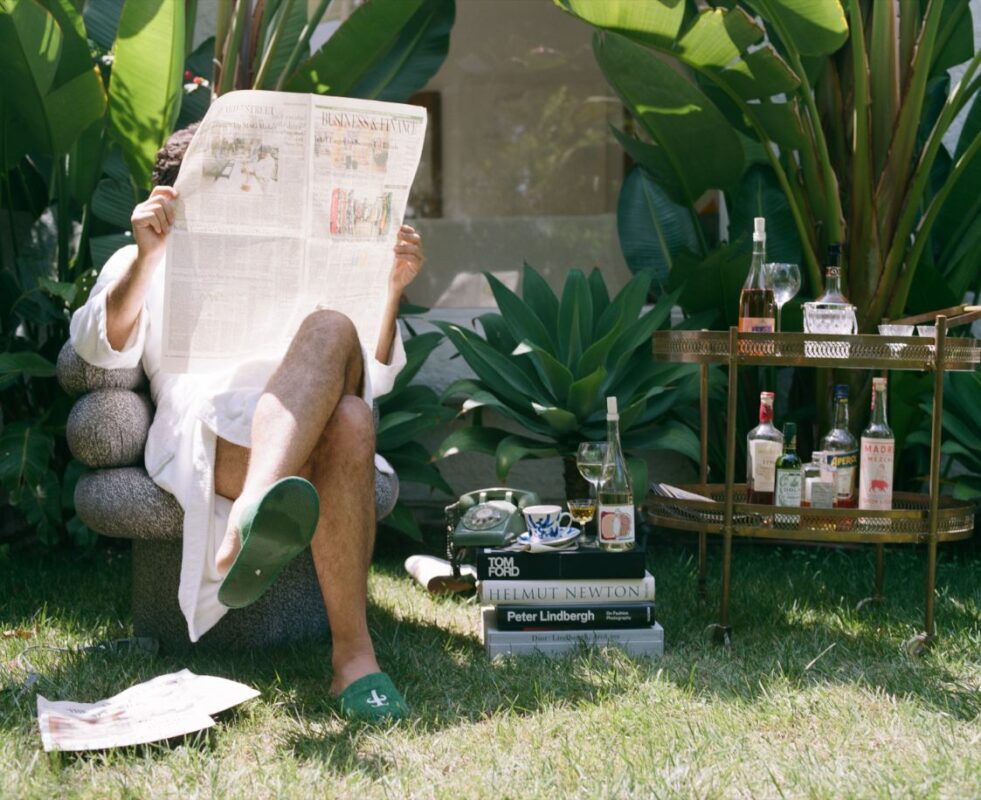
LATINNESS: Lulu, you’re trying different wines every day?
LULU: This is what we just harvested yesterday. It’s a Sauvignon Blanc, it’s fermenting. So we have to taste it every morning to see how it’s going along. Too bad you can’t smell this because it smells beautifully, like pineapple and guava.
Luckily since I try them every day our wines are lower alcohol than normal wine! A lot of the market now is looking for lower alcohol wines, which means 12% instead of 14%. If you have low alcohol, that means you have less sugar to begin with, so then you have a more acidic, fresh wine. Freshness makes you want to have a second, third, fourth glass, and makes you want to eat. Like you said, it’s a moment of pleasure. So having wines that are less alcoholic and more fresh makes you enjoy your food more as well as the moment, which is important too.
LATINNESS: I love this idea because if you’re not a wine connoisseur, when you’re planning a dinner or setting a table, wine is often just an afterthought. With this concept, EL VINO is now a part of the whole process of planning your dinner.
DANIELA: Yeah, it’s like a conversation. I actually collect plates from everywhere in the world that I go. My whole collection of homeware is a round up from everywhere I’ve traveled. So for us, it made so much sense to include this “art du table” into what el VINO was about and make it an extension of our creative collaborations.
LATINNESS: Lulu, the term “female winemaker” bothers us because you should be called only “winemaker.” You inspire the next generation of girls who want to become winemakers. Tell us, what challenges have you faced in such a traditional industry with your experience in both America and Europe?
LATINNESS: It’s funny because I left Mexico when I was 18 and lived in Bordeaux for 16 years. Of course, I knew in France it was all egalité, fraternité and I thought in Mexico, we were much more “machista” than in France. The fact is, specifically, although Mexico is much more “macho” than France for sure, in winemaking, France is very traditional. You know- cheese, wine, bread, that’s France. I suffered a lot from it while there. When I would receive people, they would assume: “Oh, you’re the marketing or PR girl” or “Are you the sales person?” It was never in production, and I once would respond explaining I’m in the production, I’m the winemaker, they were always like: “Oh, who’s your husband?” or “Are you part of the family?” It was very, very tough.
I think it was a very male dominated milieu, and a lot of people had problems understanding. For example, in my school, we (females) were the majority in the Faculty of Oenology of Bordeaux. Maybe 60% of the students were women, but out of the 60%, maybe 5% ended up working in production. So it was a thing one did to have culture, very few later dedicated themselves to this.
When I came back to Mexico, I said: “Oh, my God, if it was like this in Bordeaux, then it’s going to be hell in Mexico”. Surprisingly enough, when I came back to Mexico, since it’s a very young industry, I wasn’t a female winemaker, I was a winemaker. It was cool because we’re just starting.
In Baja, we’re the second generation of winemakers, and in the first generation there were already women. Out of ten winemakers, maybe three were women, which was a lot, so nobody cared that I was a woman, and it’s still the case. It’s not an issue. I think that’s a great point for future generations, because it just means it doesn’t depend on your culture, doesn’t depend on the country that you’re in, all of the time, I think if we support each other as an industry, that’s enough, because, of course, we can’t control our country. Right? Here in Baja, we can control our industry, and if we push that and keep talking about winemakers as a whole, it makes a huge difference.
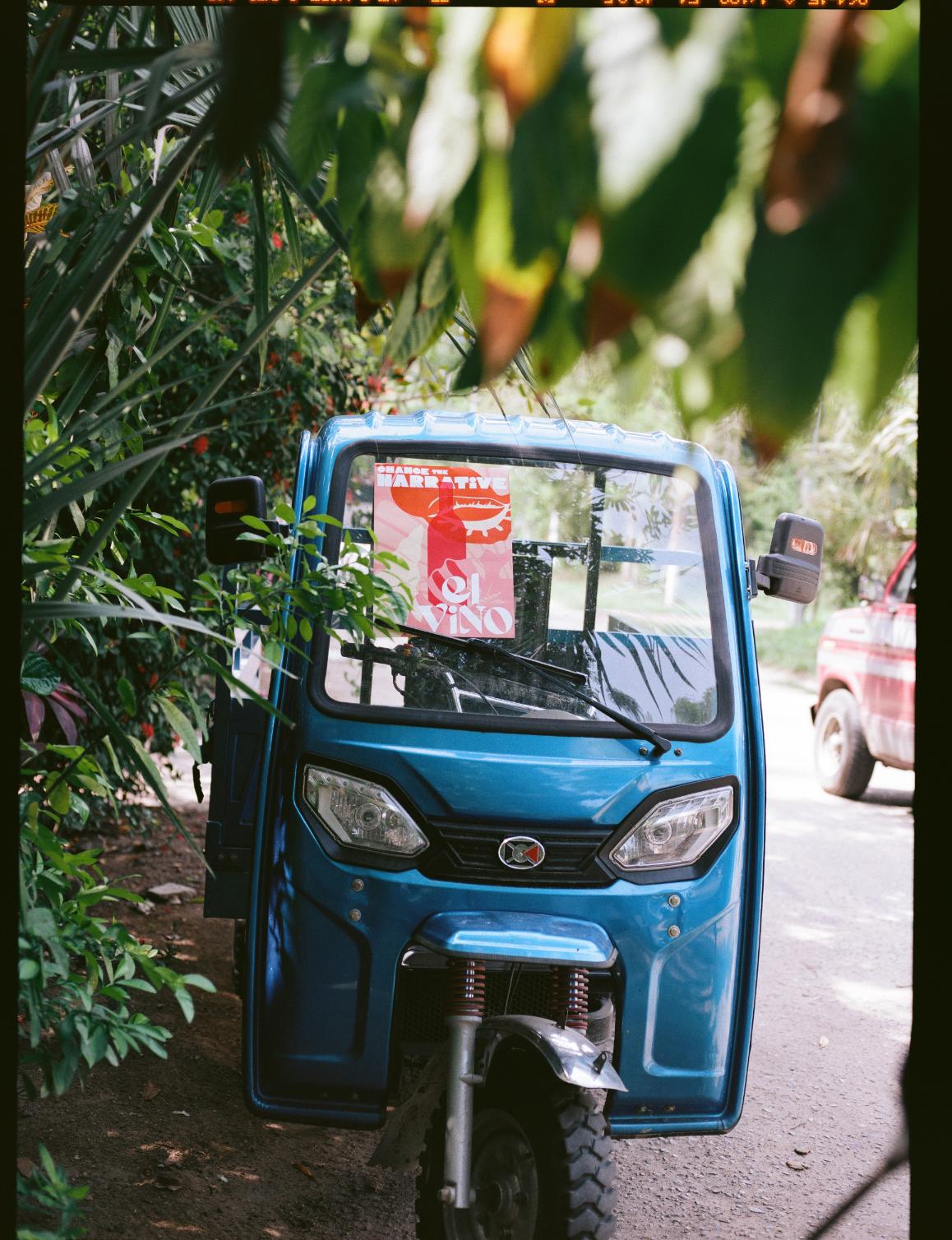
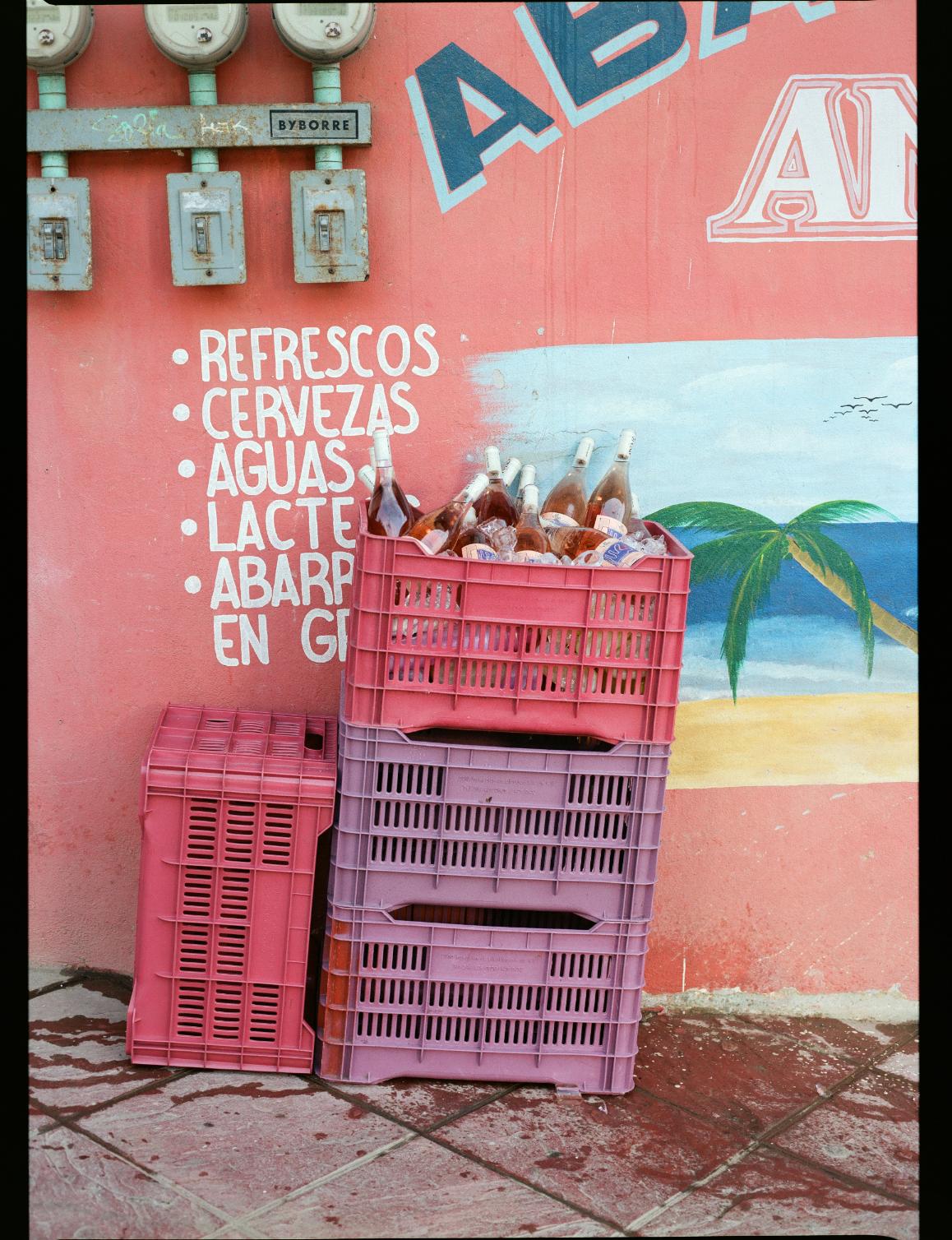
LATINNESS: I love this idea because if you’re not a wine connoisseur, when you’re planning a dinner or setting a table, wine is often just an afterthought. With this concept, EL VINO is now a part of the whole process of planning your dinner.
DANIELA: Yeah, it’s like a conversation. I think we spend so much time and money, everybody doing homeware now, and everybody wants to spend so much money on how you put the plates and how you do this. I actually collect plates from everywhere in the world that I go. My whole collection of homeware is basically from everywhere I’ve traveled. So for me, it was just a matter of like, people spend so much time on all that. You have a choice to make things pretty or not, and it’s not about having an incredible amount of money or budget. You can make things pretty on almost no budget.
LATINNESS: Lulu, the term “female winemaker” bothers us because you should be called only “winemaker.” You inspire the next generation of girls who want to become winemakers. Tell us, what challenges have you faced in such a traditional industry with your experience in both America and Europe?
LATINNESS: It’s funny because I left Mexico when I was 18 and lived in Bordeaux for 16 years. Of course, I knew in France it was all egalité, fraternité and I thought in Mexico, we were much more “machista” than in France. The fact is, specifically, although Mexico is much more “macho” than France for sure, in winemaking, France is very traditional. You know- cheese, wine, bread, that’s France. I suffered a lot from it while there. When I would receive people, they would assume: “Oh, you’re the marketing or PR girl” or “Are you the sales person?” It was never in production, and I once would respond explaining I’m in the production, I’m the winemaker, they were always like: “Oh, who’s your husband?” or “Are you part of the family?” It was very, very tough.
I think it was a very male dominated milieu, and a lot of people had problems understanding. For example, in my school, we (females) were the majority in the Faculty of Oenology of Bordeaux. Maybe 60% of the students were women, but out of the 60%, maybe 5% ended up working in production. So it was a thing one did to have culture, very few later dedicated themselves to this.
When I came back to Mexico, I said: “Oh, my God, if it was like this in Bordeaux, then it’s going to be hell in Mexico”. Surprisingly enough, when I came back to Mexico, since it’s a very young industry, I wasn’t a female winemaker, I was a winemaker. It was cool because we’re just starting.
In Baja, we’re the second generation of winemakers, and in the first generation there were already women. Out of ten winemakers, maybe three were women, which was a lot, so nobody cared that I was a girl, and it’s still the case. I think there’s an example made out of it, but nobody ever makes me feel that I’m a girl. It’s not an issue. I think that’s a great point for future generations, because it just means it doesn’t depend on your culture, doesn’t depend on the country that you’re in, all of the time, I think if we support each other as an industry, that’s enough, because, of course, we can’t control our country. Right? Here in Baja, we can control our industry, and if we push that and keep talking about winemakers as a whole, it makes a huge difference.


LATINNESS: That’s beautiful to hear.
LULU: In California, it’s the same thing. Maybe it’s not as young as Mexico, our industry, but it feels more open than Europe.
LATINNESS: When it comes to wines made in Latin America, Chile and Argentina are often at the top of mind, which is why it’s exciting to hear Mexican wine is now making waves internationally. What are some of the characteristics of wines from Valle de Guadalupe?
LULU: I think one thing that’s very, very important about it is that we are very small. When you think of Argentina and Chile, it’s huge productions. These countries are now in the top ten to top five of wine producers in the world. In Baja, that will never happen because we’re in a very desert-like climate, so we don’t have enough water to produce more grapes. Mother Nature is limiting us to stay small and that really keeps the authenticity of the wine and keeps it very personal.
And more than just wine. Baja has amazing food. I think Oaxaca and Baja California, today, are the national capitals of gastronomy. When you come to the Valle, you stay at beautiful, very boutique-like hotels with amazing architecture, drink great wines and eat amazing food, and really, when I say amazing food, we have our lobster, tuna, sea urchin, oysters, clams, crab, all fresh from the sea and prepared amazingly here with chefs that are really global trendsetters. This whole package is an experience now. Good wine isn’t enough. Good wine is the basis, you have to have everything else, right? For me, that’s what makes the region very special.
In whites you have great acidity, freshness, and great fruit. The red wines are a little bit more dense and rich, and just the combination with that, with the landscape that you’re watching and the amazing food you’re having, really makes it something different. I think that’s why Valle de Guadalupe is so popular now, because we kind of get that people want an experience now, want to live something, not just a good product, it’s the whole experience. Which is really the essence of EL VINO as well. The whole experience is how your table looks beautiful with that bottle. So I think that in el Valle what’s happening is we’re creating experiences.
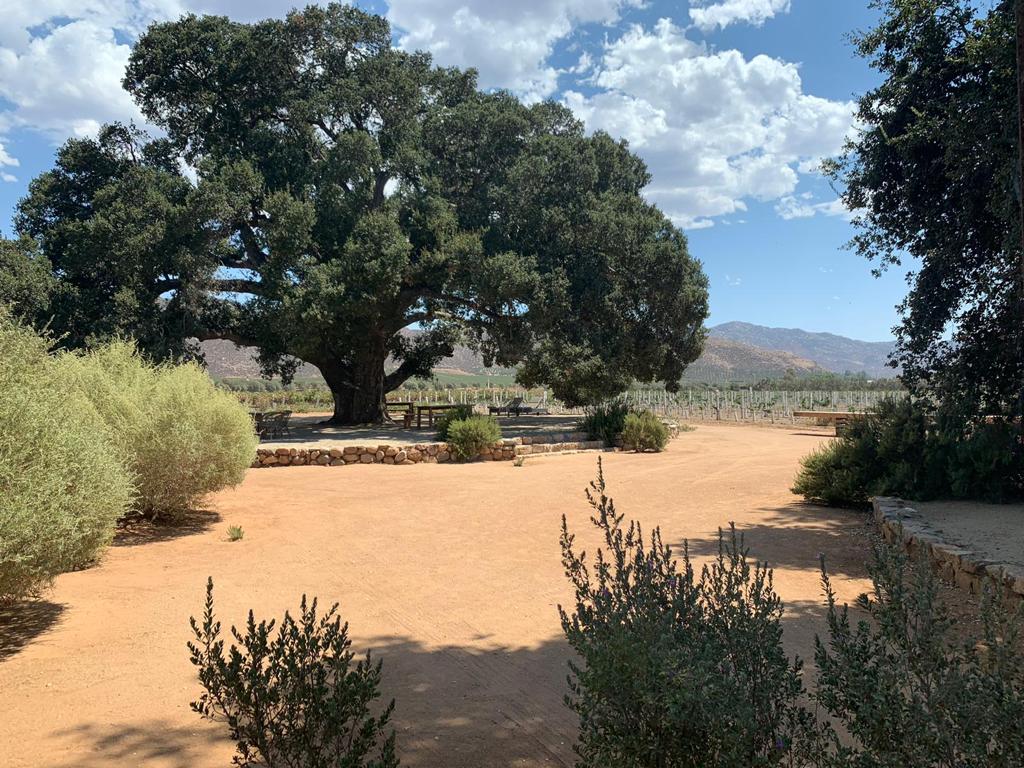
LATINNESS: And what’s something that people abroad might not know about Valle de Guadalupe?
DANIELA: Literally from West Hollywood to Valle it’s a three hour drive. I actually go for the day and come back. I’ve gone to have lunch with Lulu and come back. I think that’s important to really see. It takes longer to get to the Hamptons from New York than it does to get to the Valle from LA because there really is no traffic on the way there. It really is crazy that you’re in a different world, but so close, eating these delicious meals and drinking this delicious wine.


LULU: When I was in Bordeaux, of course, a big market was Paris. I love food. I adore food. I used to go to all these big restaurants and big chefs, which I love, but it was this white glove cloche experience. You almost had to talk like this (whispers) because you were intimidated by this beautiful milieu. It’s nice, but it didn’t feel that comfortable. I love that EL VINO and el Valle have this nonchalant luxury. A sort of brute luxury in which there are no white gloves, there’s no cloche, you have dirt and an amazing paysage, but you’re eating caviar and sea urchin and having world class food in a very laid back, non-intimidating ambience.


LATINNESS: There’s definitely a nod to Latin culture with this idea of long, laidback lunches and the sobremesa at a beautifully set table. As the only two Latins out of the five co-founders, was this intentional on your part while building the project?
DANIELA: More than anything, el VINO is a total extension of how we really live. Like how I mentioned before about setting my tables with pieces I have collected all over the world. Or that green cooler that you see in the campaign photo, the green cooler that has the sticker of EL VINO, that’s actually how I go to the beach. I literally travel with props everywhere I go because I want to bring in that level of how I like to be and how I like to live. Maybe that´s just the Latin in me. Clearly, we care about setting up the table, so to speak.
Making things pretty is a Latin essence, but if it’s pretty, you also want to stay longer, right? So if you go to the beach, and you make it pretty, you want to stay longer. The idea, as you said, is really about staying longer, like “Let’s have one extra glass of wine!”
LULU: And that’s a luxury, too, right? Sobremesa now is a luxury. We don’t give ourselves time to do stuff that we love, and sobremesa is a type of luxury today.


LATINNESS: Absolutely. While on this topic, how do these creative collaborations work with EL VINO, and what’s the plan for the future?
DANIELA: Our first collaboration is with LRNCE, who we all followed and loved. Ramya Giangola, one of our co-founders had just been to Marrakech prior to Covid and met Laurence there, so she suggested we ask Laurence to design our bottle and our label. And she loved the idea!
The creative collaborations are really about elevating the aesthetic of your every day wine and whilst they create beautiful labels and bottles also create a bespoke selection of things to enjoy around the wine such as pitchers, glasses, tablecloths, you get the feel!
Initially we thought Laurence would do one label, and it was the summer wine, but because she gave us seven labels and we fell in love with all of them, we picked three and the idea evolved that she would be our creative collaboration for the year. At the same time, we had already agreed on a collaboration with Claire V., which we are launching in November and super excited about! The spring collaboration is already confirmed, but we can’t say yet… We’ve already confirmed collaborations through next year, and every collaboration has a different kind of element related to the EL VINO lifestyle. More than a wine, el VINO is really about a way of living!
Images courtesy of EL VINO and Daniela Vargas Dieppa.

